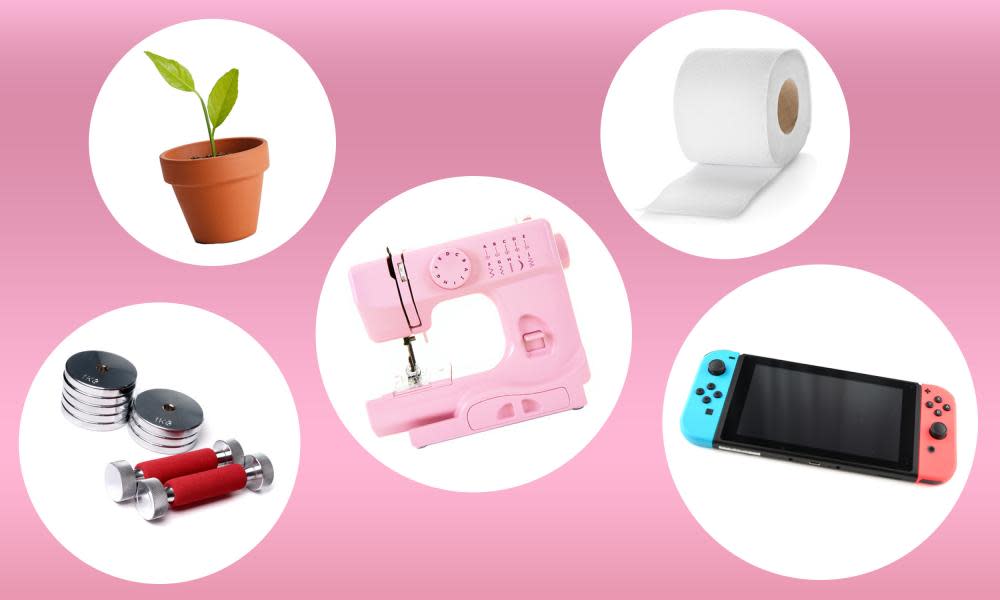Hard to find: what the shortages in household items say about how we live now

In early April, fearing his hard-won shoulders would shrink into nothing over lockdown, my husband attempted to buy some weights. He spent hours searching, online and in stores, and found no heavy things to lift. Even on Gumtree, where you’d expect an enterprising soul or two to be selling home gym equipment at jacked up prices, there was nothing.
In the end, he improvised, filling a gym bag with 40kg of sand.
Weights are not the only thing to have mysteriously vanished from shop shelves over the past few months. There’s been a national shortage of seeds, Nintendo Switch consoles are still hard to come by worldwide, and the scarcity of toilet paper is now so embedded in Covid-19 history, it has become part of museum collections.
This week, when face mask wearing became mandated in Melbourne, retailers struggled to keep up with the demand – not just for masks, but for sewing machines to make them. Although a representative from Spotlight declined to comment specifically on a sewing machine shortage, they did tell Guardian Australia that, “stock, including sewing machines and fabric, is being replenished regularly and if you are sewing masks for yourself, please consider making extras for your family, friends and members of the community”.
Related: Australia's life after lockdown survey: has coronavirus changed your opinions and behaviour?
In some cases, like the Nintendo Switch, these shortages are aggravated by Covid-19 disrupting manufacturing and supply chains, limiting product availability. In others, like toilet paper, it’s simply a matter of unpredictable demand spikes temporarily outstripping an otherwise steady supply.
Tracey Lefebure, general manager of merchandise at Bunnings Warehouse, declined to comment specifically on sold-out items, but says: “We’ve had strong sales across categories including gardening, paint and organisation as customers continue to improve their homes during this time.” She adds: “We’re working closely with suppliers to ensure we continue to meet customer demand for the products they need.”
Our taste in clothing has also shifted during the pandemic. Online retailer The Iconic says that they have not encountered any Covid-19 related issues in their supply of goods – but they have been “constantly restocking” their loungewear supplies since earlier this year; and have had to replenish their stock of Birkenstocks “almost weekly”. Puffer jackets too have sold out quickly – perhaps because more Australians are shivering whilst working from their poorly insulated homes. Predictably, in the last week face masks became The Iconic’s most sought after item.
Many of the goods that come into Australia from overseas used to arrive in the bellies of commercial passenger jets. Paul Zahra, CEO of the Australian Retailers Association says that “there’s no doubt that restrictions on airlines have lowered the number of products coming into Australia or caused delays,” but he adds “transport and delivery companies have chartered specific commercial planes to bring stock”.
International supply chains are hugely complex, and far slower moving than a global pandemic. Stock must be ordered weeks, or sometimes months in advance, while a life changing, state-mandated health order (and a desire for the products that make it possible or more bearable to comply with) take just days to put in place.
However, the longer the world exists in this altered state, the better equipped retailers are to deal with it. “There are still occasional delays after interruptions to supplies earlier in the year,” says Zahra, “however retailers continue to work hard to get alternative delivery sources to keep their stores in-stock.”
What have you struggled to find in stores lately? Let us know in the comments.


